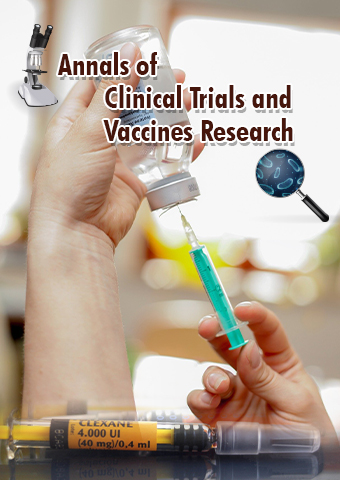Editorial - Annals of Clinical Trials and Vaccines Research (2023) Volume 13, Issue 3
Advancing Medical Research: The Promise of Clinical Trials
Robert Henry*
Department of Medicine and Therapeutics, The Chinese University of Hong Kong, Prince of Wales Hospital, Shatin, Hong Kong, China
Department of Medicine and Therapeutics, The Chinese University of Hong Kong, Prince of Wales Hospital, Shatin, Hong Kong, China
E-mail: roberthenry89@gmail.com
Received: 01-June-2023, Manuscript No. actvr-23-100011; Editor assigned: 05- June -2023, PreQC No. actvr-23-100011 (PQ); Reviewed: 19- June -2023, QC No. actvr-23-100011; Revised: 21- June -2023, Manuscript No. actvr-23-100011 (R); Published: 28- June -2023; DOI: 10.37532/ ACTVR.2023.13(3).80-82
Abstract
In the field of medical research, clinical trials represent a cornerstone for evaluating the safety and efficacy of new treatments, drugs, or medical interventions. These trials are carefully designed and conducted to provide valuable insights into potential breakthroughs, ultimately shaping the future of healthcare. By subjecting new interventions to rigorous testing and analysis, clinical trials play a crucial role in ensuring patient safety and improving overall healthcare outcomes. Clinical trials typically follow a well-defined protocol that outlines the specific objectives, methodology, and participant selection criteria. They are often divided into several phases, each serving a distinct purpose focus on evaluating the safety and dosage of a treatment or intervention in a small group of healthy volunteers or patients. Once the safety profile has been established, Phase II trials involve a larger cohort to assess efficacy and potential side effects. Phase III trials involve an even larger participant pool and provide further evidence on the intervention’s benefits, risks, and optimal usage.
Introduction
The significance of clinical trials extends beyond the evaluation of new medications. They encompass a broad range of research areas, including novel surgical techniques, medical devices, behavioral interventions, and preventive strategies. These trials involve collaboration between researchers, healthcare professionals, and patients, fostering a multidisciplinary approach to scientific investigation. Patient participation is crucial for the success of clinical trials. Individuals who volunteer to be part of these studies contribute to the advancement of medical knowledge and play an active role in shaping future treatment options. While participating in a clinical trial may present some risks, strict ethical guidelines and regulations are in place to protect the rights and well-being of participants. Informed consent, privacy protection, and independent ethics review boards ensure that ethical considerations are paramount throughout the entire trial process.
The outcome of a clinical trial can have far-reaching implications for patients and healthcare providers alike. Positive results may lead to the approval and availability of new treatments, transforming the lives of individuals affected by a wide array of medical conditions. Negative outcomes, on the other hand, provide valuable insights for researchers, enabling them to refine their approaches, develop alternative strategies, or investigate potential causes for failure. In recent years, the importance of clinical trials has gained significant recognition, leading to increased investment in research and improved collaboration between academia, industry, and regulatory bodies. Technological advancements and data analytics have further enhanced the efficiency and precision of clinical trials, allowing researchers to gather and analyze vast amounts of data to derive meaningful conclusions clinical trials represent a fundamental component of medical research, serving as a vital gateway for evaluating the safety and effectiveness of new treatments and interventions. By bringing together researchers, healthcare professionals, and willing participants, these trials have the power to transform the future of healthcare [1-3]. Through their collective efforts, they shape the medical landscape, offering hope, innovation, and improved outcomes for patients around the world.
Discussion
Clinical trials are essential in the field of medical research as they play a vital role in evaluating the safety and effectiveness of new treatments, medications, and medical procedures. These trials involve the participation of human volunteers who are willing to contribute to the advancement of healthcare. The purpose of a clinical trial is to gather crucial data and evidence to determine whether a new intervention is superior to existing methods or to assess its potential side effects [4].
One recent clinical trial that has garnered significant attention is the investigation of a groundbreaking cancer treatment. This trial aims to evaluate the efficacy of a novel immunotherapy drug in patients diagnosed with advanced-stage lung cancer. Immunotherapy has emerged as a promising approach in cancer treatment, as it harnesses the body’s immune system to target and destroy cancer cells. The clinical trial follows a meticulously designed protocol that outlines the specific procedures, inclusion and exclusion criteria, and treatment regimen for the participants [5-7]. Prior to the trial, rigorous preclinical studies were conducted in the laboratory and on animal models, demonstrating the drug’s potential effectiveness and safety. Based on these promising results, the trial progressed to the human testing phase.
To ensure participant safety, the trial is divided into different phases. Phase I involve a small number of volunteers and primarily focuses on determining the maximum tolerated dose and potential side effects of the drug. Phase II expands the participant pool and evaluates the drug’s efficacy in a larger sample size. If the results are promising, Phase III trials are initiated, involving an even larger number of participants to confirm the drug’s effectiveness and compare it with standard treatments. The clinical trial team, consisting of physicians, researchers, and other healthcare professionals, closely monitors the participants throughout the trial. They collect and analyze data on various parameters, including treatment response, progression-free survival, overall survival, and quality of life. Rigorous statistical analysis is performed to draw meaningful conclusions from the data and to ensure the reliability of the findings [8-10].
Conclusion
Ethical considerations play a pivotal role in clinical trials. Participants provide informed consent, understanding the potential risks and benefits of their involvement. Institutional review boards (IRBs) oversee the trial’s ethical aspects to protect the rights and welfare of the participants. Regular safety assessments are conducted to identify any adverse events, and if necessary, the trial may be modified or terminated early to ensure participant safety. Clinical trials are essential in advancing medical knowledge and improving patient outcomes. They provide valuable insights into the effectiveness and safety of new treatments and contribute to the development of evidence-based medicine. Through the dedication of participants, researchers, and healthcare professionals involved in clinical trials, we can pave the way for innovative therapies and better healthcare practices.
Acknowledgement
None
Conflict of Interest
None
References
- Chen X, Ning J, Wang J. The effect of atorvastatin on lipid metabolism in diabetic patients. Chin Med J. 19,215-216 (2010).
- Le L, Liu J. The analysis of adverse reaction and prevention countermeasures of statins. Mod Med. 26,1166-1168 (2014).
- Liao Y, Chen N. The observation of curative effect of Xuezhikang capsule with simvastatin for type2 diabetic hyperglycemia. Chin Med J. 5,44-45 (2010).
- Liu Y, Dong W. Effect of Xuezhikang and simvastatin on hypedipemia of non-insulin dependent diabete. J Hainan Med Univ. 19:3-4 (2008).
- Lanfan L, ZurongD. The observation of curative effect of Xuezhikang capsule for type2 diabetic hyperlipemia. Chin J Integr Med. 5,293-294 (2005).
- Zhe W. The observation of curative effect of Xuezhikang capsule with atorvastatin for diabetic hyperlipemia. J Chin Med Assoc. 10,16-17 (2012).
- Yang Y. The observation of curative effect of Xuezhikang capsule for type2 diabetic hyperlipemia. Chin J Integr Med. 17,1646-1647 (2008).
- Zhang S, Chen W. The observation of curative effect of Xuezhikang capsule for elderly diabetic hyperlipemia. Chin Med J. 5,1490150 (2010).
- Tongcui T, Bihui L. Effect of Xuezhikang on glucose metabolism of type 2 diabetes mellitus. Chin J Integr Med. 11,190-192 (2002).
- Chen W, Yang J, Ma G. The observation of curative effect of Xuezhikang capsule for diabetic hyperlipemia. J Pharm Sci. 15,146 (2000).
Google Scholar, Crossref, Indexed at
Google Scholar, Crossref, Indexed at
Google Scholar, Crossref, Indexed at
Google Scholar, Crossref, Indexed at
Google Scholar, Crossref, Indexed at
Google Scholar, Crossref, Indexed at
Google Scholar, Crossref, Indexed at
Google Scholar, Crossref, Indexed at

